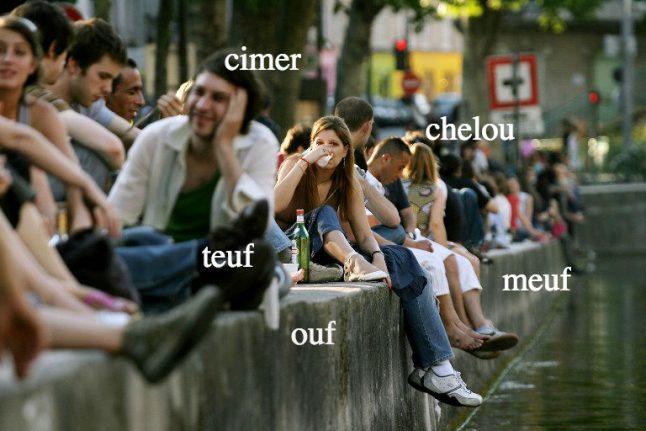In case you didn’t know, France has a “back-to-front” slang language called Verlan that can bamboozle beginners and infuriate those who learned French many moons ago (and indeed older generations of native French speakers).
In short, the language essentially sees the sounds of a word's syllables pronounced back-to-front. In fact, the word “verlan” itself is an example of Verlan, as it's the French word “L'envers” (reverse) in reverse.
But, as a foreigner, knowing how to use Verlan and knowing when to use it are two very different things.
Indeed, should a foreigner even bother using it or do we all just sound ridiculous? As non-native French speakers ourselves, we turned to French language expert Camille Chevalier-Karfis, the founder of the language site French Today, to ask for help.
“I’m 45, and I never use Verlan,” she tells The Local. “So unless you are under 30, stay away from it.”
And even if you're under-30 Chevalier-Karfis warns against trying your hand at Verlan, because you might just get it wrong.
“You'll look silly,” she warns.
Essentially she says it's like “swearing” in another language. While it might sound like fun to do it, it just never sounds right and really should be left to the locals. (Think of about when French people use the F-word too much.)
“Verlan is still a French thing, some young people use it but not every young French person does. It's a question of social class, location, age, context, and personal choice,” Chevalier-Karfis adds.
“Personally, I don't use “yo bro” in English, and it would be totally out of place coming out of my mouth,” she says.
“So careful with Verlan, swearing, interjections which may be common in movies or songs, but are not part of the mainstream French language, and will fly in a certain crowd, but may be a big faux-pas when used in the wrong context.
However if you are under 30, or if you’re just interested in learning, Chevalier-Karfis said there are a few words that are so common that you can get away with using them – in the right crowd.
These include (with translations below): cimer, tromé, ouf, reum, meuf, teuf, renoi, feuj, beur, keuf, vénèr, and chelou. Indeed some of these have made the French dictionary.
In order, these mean: merci (thanks), métro (as in the subway), fou (crazy), mère (mother), femme (girlfriend or wife), fête (party), noire (black), juif (Jewish), arab (Arab), énérvé (irritated), and louche (strange or shady). And if you think Verlan is just a passing fad, then think again, says the French teacher.
And Chevalier-Karfis warns that Verlan is here to stay, so who knows, in future maybe it will more commonplace among all French generations and classes.
“It's been part of the French culture for a long time and I don't think it's going to die out,” she says.
“Sometimes, a Verlan expression comes out in a movie, becomes a big hit, and then enters the mainstream vocabulary and everybody uses it for a while. Then it passes, until the next one.”
But while foreigners should perhaps stay away from using Verlan words when we speak, it's certainly advisable to swot up on them all, so that next time you are in the company of a young trendy student in Paris, you'll know what they are talking about.
READ ALSO:

p.p1 {margin: 0.0px 0.0px 0.0px 0.0px; font: 12.0px ‘Helvetica Neue’; color: #454545}
p.p2 {margin: 0.0px 0.0px 0.0px 0.0px; font: 12.0px ‘Helvetica Neue’; color: #454545; min-height: 14.0px}
span.s1 {color: #e4af0a}




 Please whitelist us to continue reading.
Please whitelist us to continue reading.
Member comments